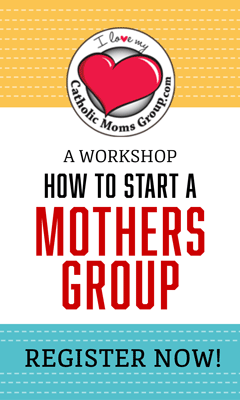
Let’s face it. The Catholic education of our children is really up to us. Even if we send our children to the best Catholic schools, to greatest CCD programs or the most inspiring, orthodox youth retreats, we can’t complain if our kids turn 18 and don’t know their Faith. Now, whether they accept it, embrace it and choose it is up to them of course, but providing the resources and the knowledge is definitely our job as parents.
The old saying you can lead a horse to water but you can’t make him drink is true. But we live in a harsh, spiritual desert, with metaphorical scorpions, snakes and high winds on all sides, and we have a very serious responsibility (a matter of spiritual life and death, actually) to take our children to the oasis, give them a tin cup, show them how to scoop and drink. We need to stand with them there before going back out in the hot dry sand. If we show them where the water is and drink with them for 18 years, they’ll know the way and have the tools. Our job is to give them the map and walk with them. Then, their journey, like ours, is self-determined. Free will, you know?
So how do we start?
Formal Curriculum
Formal curriculum is a key component in giving your child a great Catholic education. Note that this is going to take a great deal of effort. (What valuable endeavor doesn’t?). In fact, if your children are in a traditional brick and mortar school, you’ll have to decide to commit to this extra educational time as something you just do above and beyond. Homeschoolers may have an easier time; they can integrate this into their curriculum. Do not make the mistake of relegating only an hour a week, perhaps on the weekends, to do this. To become proficient at anything you have to do it regularly. A gymnast wouldn’t dream of practicing only once a week and expect to place high in a competition. Our stakes are higher than an award for competition. What’s at stake is our children’s souls. This formal religious education must be addressed daily, albeit in small, doable increments. Don’t worry if you don’t know your Faith as well as you’d like. You can learn with them.
Beginning in the youngest grades, start reading the red St. Joseph Baltimore Catechism No. 1 and memorizing each lesson, word for word. This gem of a book contains the distillation of the truths of the Catholic Faith. In fact, chapters delve into the Apostle’s Creed, phrase by phrase, with an explanation of each, then on to the Commandments, Sacraments and Prayer. This book provides a great first apologetics experience. Your child, having finished learning the content of the book, will be able to explain his faith to another in simple terms, even if he is just ten.
No worries if your kids are older. You can start this any time. Adjust the pace to fit the older student’s needs. If an older student resists this “easy” book, remind him that you always start something at the beginning. You learn to play one hand at the piano, slowly and evenly, before you move on to two and certainly before you tackle a Mozart concerto.
Is memorization necessary? Yes. Learning the actual words is the first step to committing the concept to memory. The simple explanations in this first catechism book are the ” hook” upon which all explanations of concepts learned soon and later will fit. As time goes on, more understanding will occur, but the boiled down, basic tenets will be committed to memory, hopefully for life. This is no small accomplishment.
Next, read with your child the more advanced grey St. Joseph Baltimore Catechism book No. 2, which provides more explanation. Honestly, you’ll never have spent a better $5.95. No need to memorize this book, but read for understanding and to build on the ‘hook’ that the memorized catechism from the previous book provided. Enjoy the simple drawings in the book with the cartoon feel. They really do help commit the ideas to memory.
Next, start to collect and read some saint biographies. Let the kids help you choose ones of particular interest to them. Some of my personal favorites for youngsters include the Vision Series from Ignatius Press (there’s even a teacher’s guide for these on the publisher’s website if you are interested in delving deeper), the Mary Fabyan Windeatt series, and the Encounter the Saints series from Pauline Books and Media. Others are easily found with Google searches. Always keep a saint book next to your child’s nightstand. Read just a bit with him every night. Kept that going in order to keep in front of you how others lived out the Faith in their lives.
Don’t forget Bible study! Start with God’s Merciful Love (for Old Testament study) around sixth grade, then go on just to read the New Testament. Start anywhere! If you need some background understanding, get Peter Kreeft’s You Can Understand the Bible and use that to explain the various biblical books to your child. You’ll learn something too. By eighth grade, Midwest Theological Forum’s Introduction to Catholicism is a great choice. The book is thick and meaty, but the kids will definitely be ready for it after the aforementioned studies. If you like, you can split the book up over a two-year period .
Aim for understanding not perfection of particularly worded response. Talk about the moral issues presented, in light of faith. Encourage your children to come up with examples (using news on the Internet, or experiences in real life) to apply their new knowledge and understanding.
Midwest Theological Forum offers other great books in the same series. San Juan Catholic Seminars puts out good apologetic materials in inexpensive, booklet form. Find those here: http://shop.catholicapologetics.com/
If your kids are in traditional Catholic high school, be sure to oversee the religious books they study. Many high school administrators make excellent curriculum choices. However, some do not. As a parent, your responsibility doesn’t end when the kids head into religion class. Keep reading. Keep discussing. This will never end, nor will you want it to.
Active Participation
Book knowledge is just one part of giving your child a great Catholic education. Active participation is another. Your kids will learn the Faith by the way you live it. Development of virtues such as kindness, patience and understanding is critical.
Learn about and live the liturgical year. Do an Internet search of the liturgical calendar; download and print it, and put in a prominent place so the family knows where each week falls. Talk about the colors used at Mass and what they mean. Discuss the parts of the Mass. Share your thoughts about a recent homily.
Frequent the sacraments as a family. Schedule in confession just like you’d schedule in a social event you want to be sure to attend. Once a month for confession is a good goal. Make it a pleasurable experience. Do a quick pick up of the house on Saturday morning. Head out to confession together, then enjoy the treat of a lunch out. The kids will even begin to look forward to it. Attitude counts a lot. As a parent, it is important you model positivity in going to Mass, in going to confession, in devotions such as praying the Rosary as a family. This is your duty- even if you struggle. Handle it nobly. The kids are watching.
Display pictures or statues that represent your Faith in your home. No, your house doesn’t need to look like a small Catholic museum or bookstore, but people entering your home should be able to tell you are Catholic when they walk in. Your children need this reminder too. At minimum, have a family crucifix and an image of our Blessed Mother. Some families like to have a little prayer table in the corner of a living room, where they keep small devotion books and Rosaries for family prayer. Some mothers like to plant “Mary Gardens” outside their kitchen windows, with favorite annual or perennial flowers and a statue of a favorite image of the Blessed Mother to remind them of Mary’s love and example throughout the day. Children may want mementos of their patron or other special saints in their rooms. What little boy wouldn’t want a small statue of St. Michael stabbing the devil on his dresser? These are the heroes we introduce to our children. Kids remember the images seen in their homes during their youth. These tangible objects serve as gentle reminders to pray, to be kind to one another, and to know God is ever present in a loving family’s home.
Fathers: A Key Component
Interestingly, a Swiss study indicates that it is the religious practice of the father of the family that, above all, determines the future attendance at or absence from church of the children. Are you surprised? As one author states, this is not for moms “to think they have no role in passing on their faith to their children. However, clearly moms need to give their husbands the respect and influence in their homes to be active in their children’s formation.” Dads, you are incredibly important in giving your child a great Catholic education and providing the best odds they will take the Faith as their own and practice it into adulthood. You matter. Please lead your family.
Logic, Writing, and Oral Communication
Teach your children to think logically and to communicate effectively, both in speaking and in the written form. This may seem a little off the topic of giving your child a great Catholic education, but really it isn’t. As children learn logic, they learn how to critically think. This helps them both understand and defend their Faith. Teach your children that not everything in print or online is true and to discern arguments’ validity through logic. Help them reason through difficulties they have with particular Church teachings. Encourage them to ask questions and do admit when you don’t know an answer, but promise to help them find out. Teach them the difference between the Church established by Christ, which will not fail and which will be with us until the end of time, and the fallible humans who occupy positions within it. In short, give them the tools to know, love and serve Christ in this world so they can be happy with Him in the next.
Whether your children attend a Catholic, private, public or home school, you can give them a great Catholic education. It begins with you and it begins any time you would like to start. Bring them to the oasis and let them drink.
Parents have the first responsibility for the education of their children. They bear witness to this responsibility first by creating a home where tenderness, forgiveness, respect, fidelity, and disinterested service are the rule. The home is well suited for education in the virtues. This requires an apprenticeship in self-denial, sound judgment, and self-mastery – the preconditions of all true freedom. Parents should teach their children to subordinate the “material and instinctual dimensions to interior and spiritual ones.”
Parents have a grave responsibility to give good example to their children. By knowing how to acknowledge their own failings to their children, parents will be better able to guide and correct them…
(Catechism of the Catholic Church 2223)
Theresa Thomas



